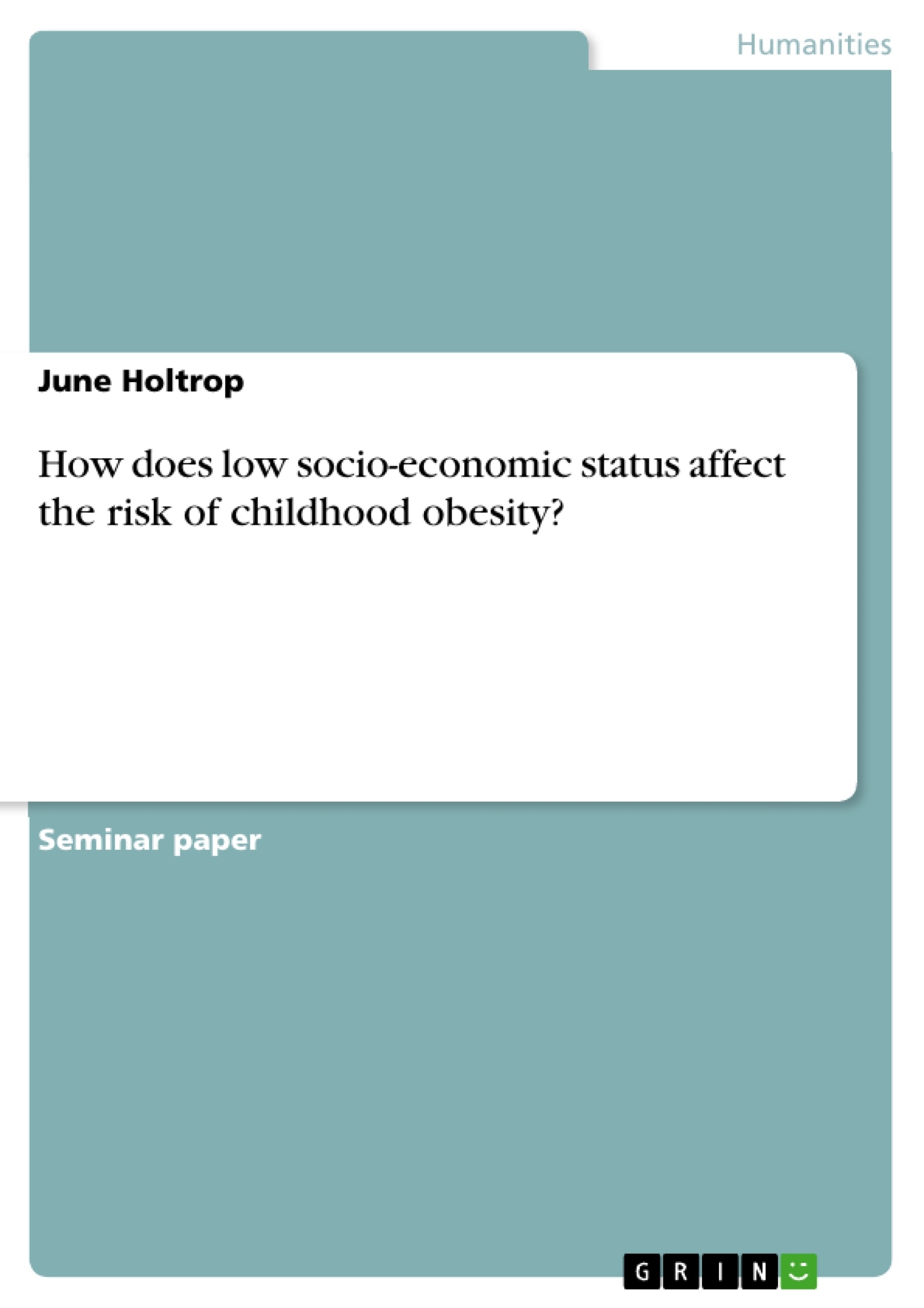The goal of this paper is to explore ways in which low socio-economic status affects the risk of childhood obesity. First, theories and hypothesis will be classified in order to create a theoretical foundation for the paper. Several different studies will be selected and discussed to portray the broad spectrum of research on this topic as well as to gather different perspectives on the matter. Selected studies and results will be comprehensively discussed. Finally, prospects for further research as well as policy suggestions will be addressed.
Obesity – a pandemic of the twenty-first century – is affecting more than a billion people worldwide. The struggle with access adipose tissue and its physical as well as social effects does not just affect adults: in America, one of six children suffers from being obese. Worldwide, this number accounts for 39 million children. The World Health Organisation called childhood obesity ‘one of the most serious public health challenges of the 21st century’. Studies have shown that childhood obesity strongly correlates with adulthood obesity. Therefore, it is important to intervene and reduce childhood obesity as a risk factor for excess bodyfat and its severe health consequences in adult life. This research paper will take a closer look at the effect of socio- economic status on this matter. It’s important to state that this paper is limited to focus on the western world, since the association between socio-economic status and childhood obesity varies from county to country based on the country’s socio-economic status.
The research question: "How does low socio-economic status affect the risk of childhood obesity?" is sociologically relevant due to the enormous impact of obesity on the social system as well as other socio-economic aspects of modern societies. In the United States, the estimated annual healthcare costs of obesity-related illness are around $190 billion, of which approximately $14 billion has been attributed to obesity in childhood. Other than monetary resources, obesity has an impact on social and emotional aspects of life, like employment chances, education, stigmatisation and self-confidence. These factors in turn, also contribute to increased costs for the social system in the shape of time and money. By conducting research on mechanisms that explain the effect of socio-economic status on the likelihood of childhood obesity, policies can be created to reduce this effect.
Inhaltsverzeichnis (Table of Contents)
- Introduction
- Theory and hypothesis
- Description selected studies
- Results selected studies
- Discussion of the results with regard to research question and hypothesis
- Prospects for further research
Zielsetzung und Themenschwerpunkte (Objectives and Key Themes)
This research paper aims to investigate the relationship between low socio-economic status and the risk of childhood obesity. It explores the underlying theories and mechanisms that explain this connection, with a focus on the Western world. The paper aims to contribute to a better understanding of the problem and to inform potential policy interventions.
- The impact of low socio-economic status on childhood obesity
- The role of health literacy as a mediator in this relationship
- The influence of parental education on health literacy and obesity risk
- The importance of addressing social inequalities in the context of childhood obesity
- Potential policy interventions to mitigate the effects of low socio-economic status on childhood obesity
Zusammenfassung der Kapitel (Chapter Summaries)
- Introduction: This chapter introduces the issue of childhood obesity as a global health challenge, highlighting its prevalence and the strong correlation between childhood and adult obesity. It emphasizes the importance of understanding the connection between socio-economic status and childhood obesity to develop effective interventions.
- Theory and hypothesis: This chapter explores the theoretical framework for understanding the relationship between socio-economic status and childhood obesity. It discusses the concept of health literacy and its role as a potential mediator, arguing that low socio-economic status can lead to lower levels of health literacy, which in turn increases the risk of childhood obesity.
- Description selected studies: This chapter presents a comprehensive description of the selected studies relevant to the research question. It clarifies the terms "adiposity" and "obesity" as used in the studies, emphasizing their interchangeable usage to refer to all levels of excess weight in children.
Schlüsselwörter (Keywords)
The key concepts and themes explored in this research paper include childhood obesity, socio-economic status, health literacy, parental education, social inequalities, and policy interventions. The paper focuses on understanding the impact of low socio-economic status on childhood obesity, examining the role of health literacy as a mediator in this relationship. It aims to contribute to a more nuanced understanding of the problem and to inform the development of effective solutions.
Frequently Asked Questions
How does low socio-economic status (SES) increase obesity risk?
Low SES is often linked to lower health literacy, limited access to healthy foods, and different lifestyle patterns that contribute to excess body fat.
What role does "Health Literacy" play?
Health literacy acts as a mediator; parents with higher education often have better health knowledge, which reduces the obesity risk for their children.
Is childhood obesity a predictor for adult health?
Yes, studies show that childhood obesity strongly correlates with obesity in adulthood and its associated severe health consequences.
What are the estimated costs of obesity in the US?
The annual healthcare costs are estimated at $190 billion, with $14 billion specifically attributed to childhood obesity.
Why is the study limited to the Western world?
The association between SES and obesity varies significantly based on a country's overall development level, making Western results not universally applicable.
- Quote paper
- June Holtrop (Author), 2023, How does low socio-economic status affect the risk of childhood obesity?, Munich, GRIN Verlag, https://www.grin.com/document/1359568



